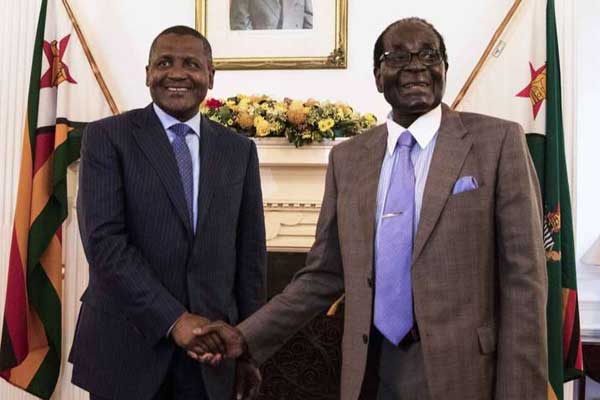When Nigerian billionaire Aliko Dangote visited Zimbabwe, a state of euphoria gripped the country, as the hard-hit Zimbabweans believed a saviour to deliver them from their economic crisis had arrived.
Zimbabweans are so hard up that any investor with money is given rock star treatment, after government’s previous efforts to lure investments having drawn a blank.
Only recently, President Robert Mugabe visited China and claimed to have signed “mega deals” and that would end Zimbabwe’s days of woe. But that excitement soon died down as reality hit that China was not about to invest significantly in the country.
Last year, President Mugabe visited Russia where he signed a $4 billion platinum mining deal that would have seen Moscow tapping into the southern African country’s vast mineral resources.
However, just like the Chinese ‘mega deals’, the Russian multi-billion deal remains just on paper.
Enter Mr Dangote, the cement mogul whose net worth is estimated at $17.5 billion by the Forbes magazine, and suddenly Zimbabweans have their chins up. The tycoon was given a reception befitting a head of state when he jetted into Harare recently.
He met President Mugabe, his two Vice-Presidents Emmerson Mnangagwa and Phelekezela Mphoko as well as several Cabinet ministers before flying out the same day.
APPROVED DANGOTE’S PLANS
A day later, Transport and Infrastructure minister Obert Mpofu announced that the Cabinet had approved Mr Dangote’s plans to set up a cement plant, coal mine and power station.
The government said it expected the investments to begin as early as next year.
President Mugabe had also assured the Nigerian that his investments would be secure despite the country’s controversial indigenisation laws that force foreigners to cede 51 per cent of their shareholding in companies to locals.
State media has since gone on the overdrive, trumpeting the Nigerian businessman’s promised investment as the panacea to Zimbabwe’s economic problems.
Overnight, Mr Dangote’s deal had overtaken the Russian and Chinese mega ones in the state media’s trajectory on the economy.
“While investors from the West see an adverse and hopeless situation in Zimbabwe, Mr Dangote has seen an investment opportunity that will undoubtedly bring grist to his mill,” reported the State controlled Zimbabwe Broadcasting Cooperation (ZBC) on its website.
“That investment potential has inspired the business magnate to consider investing billions of dollars in Zimbabwe’s key economic areas of mining, energy and cement production,” the broadcaster added.
“The investments will go a long way in resurrecting the economy that was ravaged by the illegal sanctions imposed by the West at the behest of the (opposition) MDC (Movement for Democratic Change) party.”
SING HIS PRAISE
Other state media channels such as The Herald daily newspaper have been lining up economic commentators to sing Mr Dangote’s praises ad nauseam.
The businessman said he had made up his mind about investing in Zimbabwe before flying out.
“We had a very, very good meeting with the president and I told him that we …decided to invest in the three areas, one is power, second one is cement and third one is coal,” he told journalists after the meetings.
According to media reports, Mr Dangote is expected to invest about $400 million in the projects. However, some Zimbabweans remain pessimistic, citing the country’s poor record in attracting foreign investment due to red tape, hazy policies and the long running economic recession.
Former Education minister David Coltart expressed doubts that the investments would take off.
“I hope (Mr) Dangote succeeds because through his investment Zanu-PF (the ruling party) may learn hard lessons on what it takes to attract genuine foreign investors,” Mr Coltart said.
“Mr Dangote will find forests of red tape to cut through and hundreds of back pockets which have to be filled before he gets off the ground.
“While every Zimbabwean welcomes investors such as (Mr) Dangote’s, reality is that even if implemented now it would take some time to bear fruit.”
According to ZBC, Zimbabwe attracted investment worth a ‘mere’ $450 million last year.
The broadcaster said the government was planning to overhaul the Zimbabwe Investment Authority – a state institution that approves foreign investment deals.
“Economic Planning and Investment Promotion minister Ambassador Simon Khaya Moyo says the time is now to embrace a revolutionary work ethic and deliver tangible results, hence the move to come up with a new board at the authority,” ZBC reported.
Zimbabwe is ranked 171 out of 189 countries on the World Bank’s ease of doing business index.
Mr Dangote pointed out some of the obstacles that could be hindering investment in Zimbabwe after meeting Tourism minister Walter Mzembi.
“My last call to (Mr) Mzembi that he works at investing in an open airs system so that investors can enter into the country freely,” he said.
“You know, there are so many permits and whatever, but the government promised to accelerate the process and as soon as we get things right, we will move.”
“The time frame for the investment is dependent on getting all the documentation, for instance the mining licences, but if we get everything this year, we will start construction by the first quarter of next year.
“We will move very fast, but that all depends on the government.”
Nigeria is classified as Group C in Zimbabwe, which means that its nationals need visas to visit the country.
KEEPING INVESTORS AWAY
Mr Dangote’s visit showed that not only political and inconsistent policies were keeping investors away.
“Dangote’s remarks show that in fact, while most investors always complain about Zimbabwe’s sovereign, economic and political risk, as well as poor credit rating and bad policies, there are other problems complicating the ease of doing business locally,” the paper wrote in an editorial.
“That’s why Zimbabwe needs far- reaching reforms, not just tinkering.
“The issue of visas is usually not discussed, but the Nigerian tycoon’s experience shows investors are often confronted with many other barriers to come to Zimbabwe.
“Apart from visas, there are bureaucratic and legislative obstacles.”
A fortnight ago, President Mugabe moved in to allay foreign investors’ fears about putting their money in an unpredictable Zimbabwean economy, promising to repeal all laws that hamper business.
The 91-year-old leader, in a state of the nation address, said he welcomed the country’s re-engagement with the West, the International Monetary Fund and the World Bank.
Zimbabwe recently reduced its growth forecast for 2015 from 3.2 per cent to 1.5 per cent.
A severe drought that reduced the staple maize output by half was blamed for the projected slow economic growth.
Culled from Iroko Reports
 Hottestgistnaija.com
Hottestgistnaija.com




